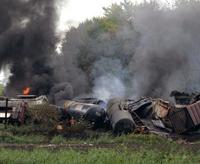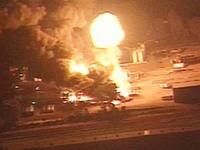-
Railroads do not let HAZMAT teams know what is on train

Lethal chemicals roll through the backyards of cities and towns without the knowledge of these towns; residents; railroads do not share information about the schedule and contents of HAZMAT cargo with these towns’ emergency services, so the services cannot prepare for catastrophe; if chlorine or ammonia were to escape from a punctured tanker — in an accident or derailment — it would form a toxic cloud; a compromised 90-ton rail car of chlorine could create a plume fifteen miles long by five miles wide; the U.S. railroad industry transported some 75,000 tank cars of toxic inhalants nationwide in 2009
-
-
China's Three Gorges Dam's showing cracks
The Three Gorges Dam is China’s largest construction project since the Great Wall; the dam was hailed as an engineering feat that could withstand the worst flood in 100 years, but this year’s torrential rains have severely tested its capacity to control the surging Yangtze
-
-
Texas police building withstands gun attack, showing value of secure design
Secure access points and the arrangement of rooms create a buffer between McKinney law enforcement officials and the public; windows sit just above eye level to prevent direct attack; they slope to limit ledges for explosive devices; bulletproof glass protects the lobby, and bullet-resistant liner lies inside the masonry walls
-
-
-
Small bridge sensors will give early warnings of anomalies, weaknesses
University of Maryland researchers devised a lightweight, low-power, wireless, credit card-sized sensor that will detect weaknesses in bridges and other infrastructure before they can turn into calamities; the sensors would detect anomalies in the structure of even the most inaccessible parts of bridges and send alerts via cellular frequencies to its human masters. Among the things it would measure would be stress loads, vibration, temperature and the creation and growth of cracks
-
-
New levee design, construction materials tested in Louisiana
Since Katrina, attention has been riveted on $14 billion worth of federal projects to rebuild the deficient hurricane levee system so it can better defend from surges out of lakes Borgne and Pontchartrain; the Army Corps of Engineers plans to start experimenting with a new construction method, which relies on a mix of lime and clay to build the test levee higher without widening the levee base; this method of raising existing river levees can be done faster than a standard raising and will not require buying additional land to expand the base; mixing lime and clay and water will not produce concrete, which has a measured strength of 3,000 pounds per square inch, or psi, the mixture will have a strength of 80 to 120 psi — substantially greater than the 3 to 5 psi of a compacted clay levee
-
-
Disaster response experts call for "red-helmet brigade"
Experts say that the world need to be better prepared to respond to natural disasters such as the Pakistan floods of the Haiti earthquake; they say that an organization such as the UN Office for the Coordination of Humanitarian Affairs should establish a special response unit to set up a computerized database that identifies all available assets routinely needed in an emergency — emergency personnel, medical personnel, water, non-perishable food stuffs, extraction machinery, temporary shelters, and field hospitals; some supplies could be held in locations around the world, ready to be dispatched as soon as disaster assessment experts working for a central command and control center arrive on the scene of a catastrophe
-
-
Undersea oil remains in Gulf of Mexico
A study of the effects of the Deepwater Horizon spill has confirmed the presence of a toxic chemical residue one kilometer below the sea surface; the investigation shows a plume of crude oil-based chemicals up to 200 meters high and 2 kilometers wide, extending 35 kilometers from the spill site
-
-
Scanning for oil from the air
A Scottish firm develops technology to scan for underground oil deposits from the air; the technique called atomic dielectric resonance (ADR), detects and measures onshore oil reservoirs using radio and microwaves, reducing the need to drill test wells
-
-
China, Pakistan floods; Haiti earthquake: not merely "natural" disasters
The recent disasters in Pakistan, China, and Haiti have done more than kill thousands and displace millions: they have raised questions about whether the modifier “natural” — as in “natural disaster” — is accurate in describing the sources and scope of the catastrophes; these and other recent disasters, in other words, raise questions about how much of the damage caused comes from the forces of nature and how much is the result of human activity; experts say that a major contributing factor to the scope of these disasters are development decisions which are too often controlled by wealthy and corrupt elites who have no interest in protecting people who have been marginalized by poverty
-
-
Scientists call for a global nuclear power renaissance
Scientists call for a 2-stage campaign to revive nuclear power; the first stage could see countries with existing nuclear infrastructure replacing or extending the life of nuclear power stations, followed by a second phase of global expansion in the industry by the year 2030; the team says their roadmap could fill an energy gap as old nuclear, gas, and coal fired plants around the world are decommissioned, while helping to reduce the planet’s dependency on fossil fuels
-
-
Obama panel recommends active U.S. backing for clean coal
A panel appointed by President Obama calls for an active U.S. government role in promoting carbon capture and storage, or CCS, a largely undeveloped technology that aims to prevent carbon emissions blamed for global warming from entering the atmosphere; panel recommends government’s consideration of accepting liability over carbon storage sites for thousands of years to come
-
-
Gulf's future depends on oil-eating bacteria, lingering toxicity
Many marine bacteria have evolved to consume oil and other hydrocarbons, and now the spill has allowed these bacteria to follow their food beyond their natural habitat near oil seeps at the bottom of the Gulf; microbes may degrade the oil quickly, but their activity could eventually pose risks to the Gulf’s ecosystem, particularly in the deep ocean; scientists also worry about lingering toxicity — this is because oil’s toxic constituents, such as polycyclic aromatic hydrocarbons, can disrupt reproduction of marine organisms and can lower their offsprings’ vitality; this chronic toxicity will be magnified along the Gulf Coast’s beaches, salt marshes, and wetlands, because oil degradation in these sites will proceed at a much slower pace than in oxygen-rich environments
-
-
Statue of Liberty will close for one year for security upgrades
The Statue of Liberty will be closed for about a year on 12 October 2010 for security work; the $26 million dollar project will add fire-proof staircases, elevators, and exits
-
-
Chemical industry spends millions shaping chemical facilities security legislation

Fourteen parent companies own chemical plants which endanger a large number of people in the United States in the event of an accident or attack on one of their chemical facilities; these 14 parent companies own 163 facilities in 37 different states and Puerto Rico; the facilities owned by The Clorox Company, Kuehne Chemical, and JCI Jones Chemical each put more than 12 million people at risk; these fourteen companies and their affiliated trade associations spent $69,286,198 lobbying the committees with jurisdiction over chemical security legislation in 2008 and 2009; the political action committees (PACs) of these fourteen companies and the PACs of their affiliated trade associations gave $2,187,868 in the 2008 election cycle and the 2010 cycle to date directly to the campaigns of members of the committees of jurisdiction over chemical security legislation
-
- All
- Regional
- Water
- Biometrics
- Borders/Immig
- Business
- Cybersecurity
- Detection
- Disasters
- Government
- Infrastructure
- International
- Public health
- Public Safety
- Communication interoperabillity
- Emergency services
- Emergency medical services
- Fire
- First response
- IEDs
- Law Enforcement
- Law Enforcement Technology
- Military technology
- Nonlethal weapons
- Nuclear weapons
- Personal protection equipment
- Police
- Notification /alert systems
- Situational awareness
- Weapons systems
- Sci-Tech
- Sector Reports
- Surveillance
- Transportation
Advertising & Marketing: advertise@newswirepubs.com
Editorial: editor@newswirepubs.com
General: info@newswirepubs.com
2010-2011 © News Wire Publications, LLC News Wire Publications, LLC
220 Old Country Road | Suite 200 | Mineola | New York | 11501
Permissions and Policies
Editorial: editor@newswirepubs.com
General: info@newswirepubs.com
2010-2011 © News Wire Publications, LLC News Wire Publications, LLC
220 Old Country Road | Suite 200 | Mineola | New York | 11501
Permissions and Policies
